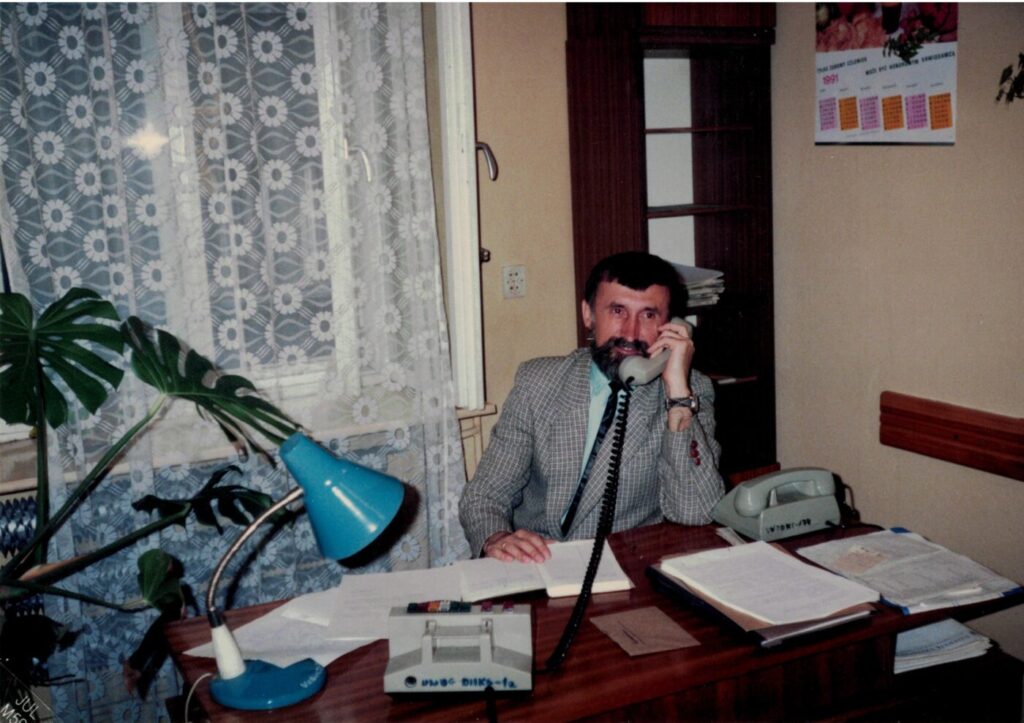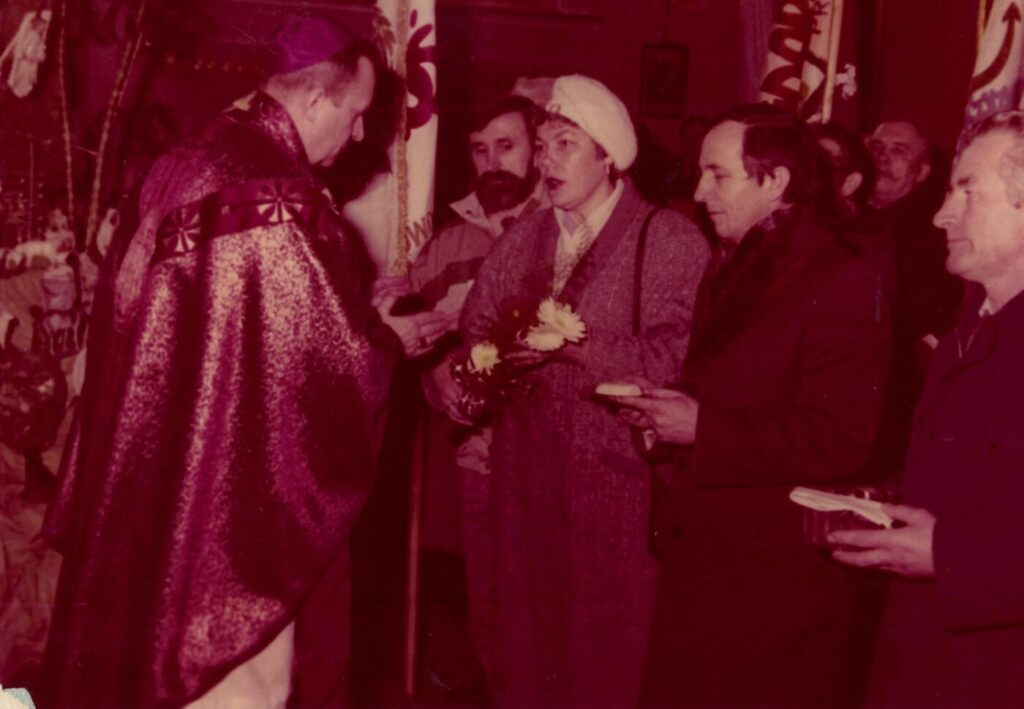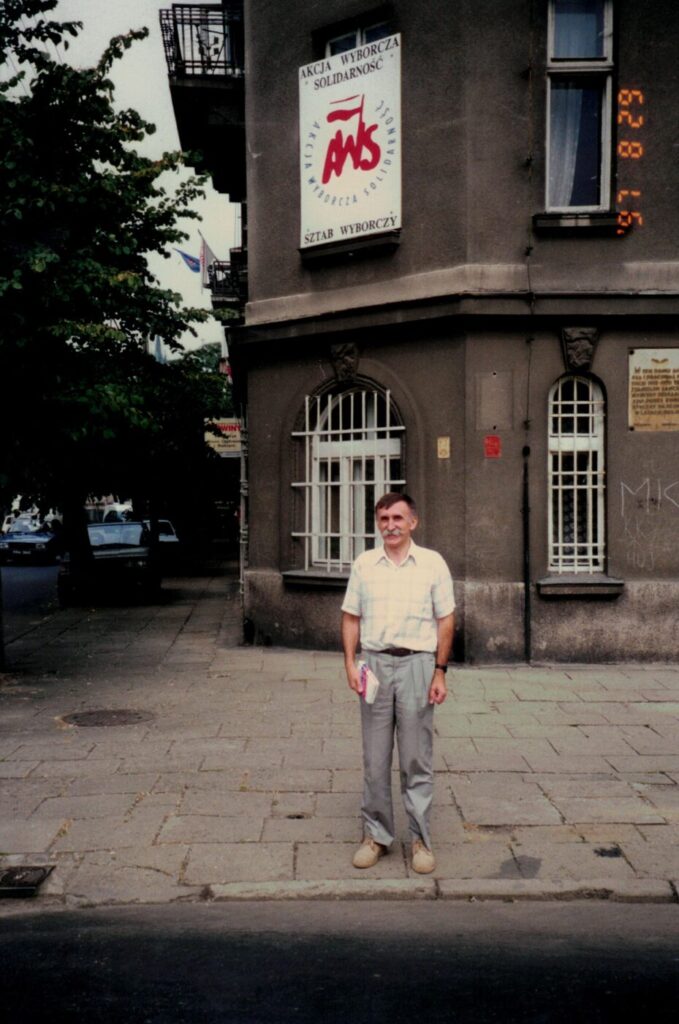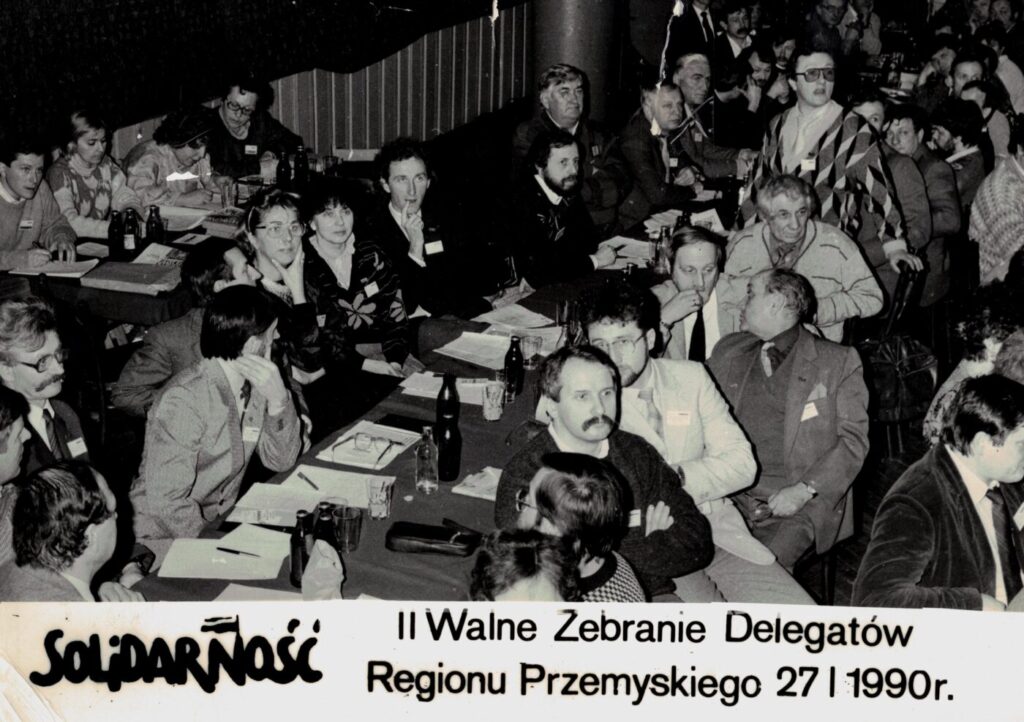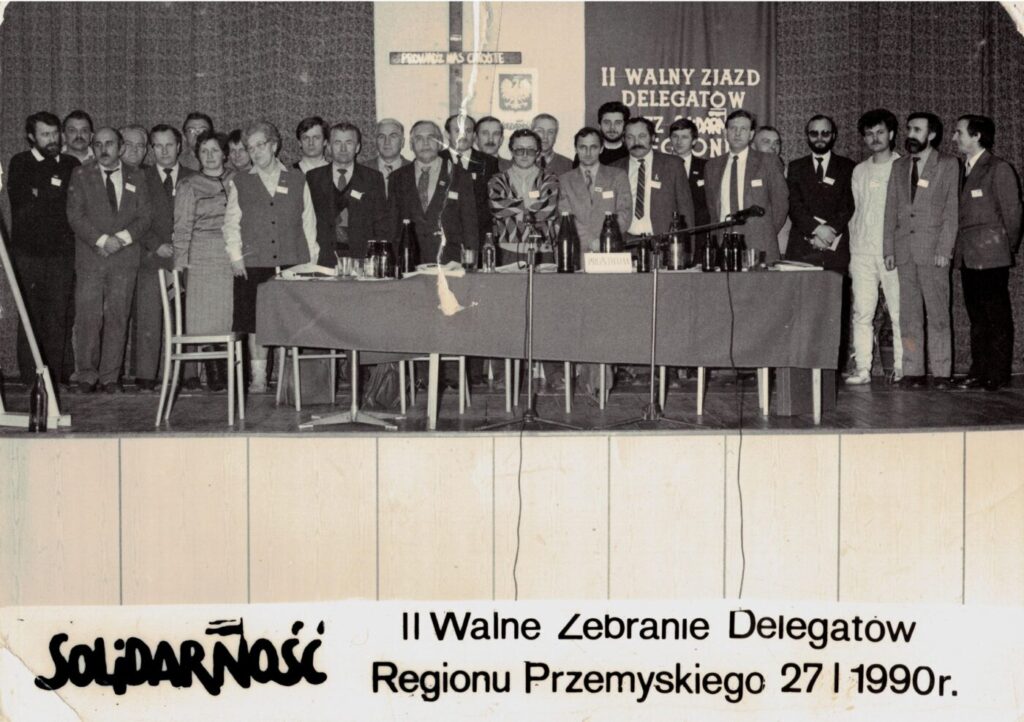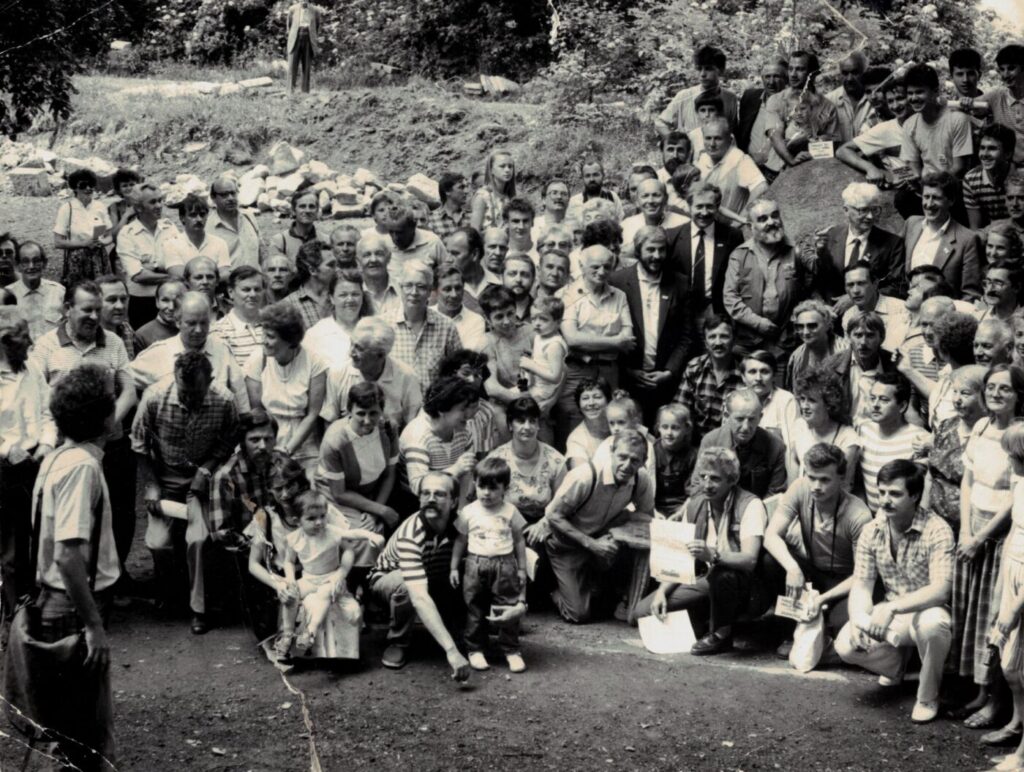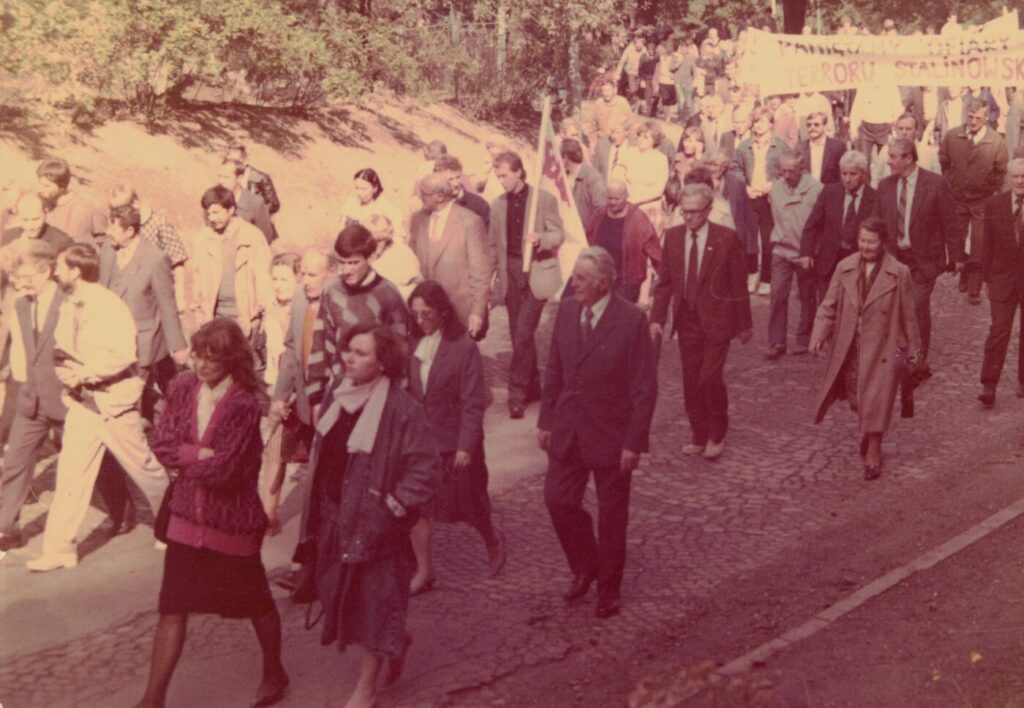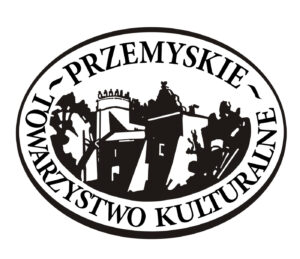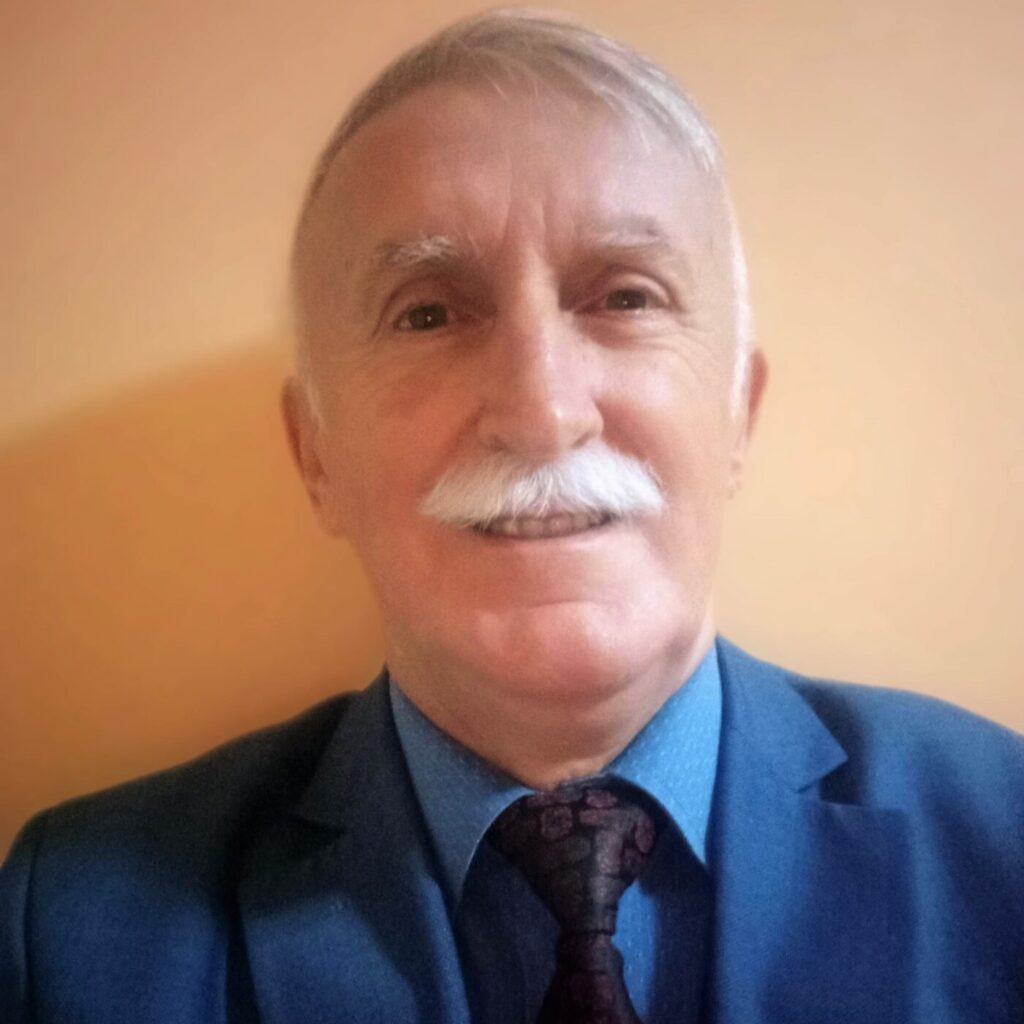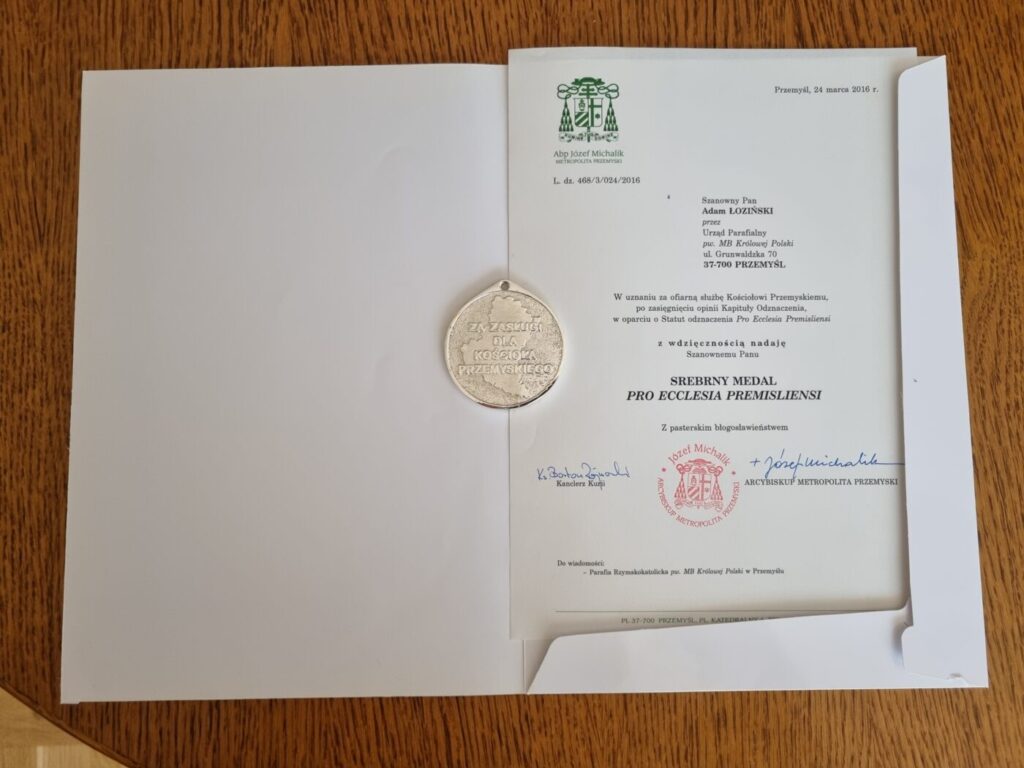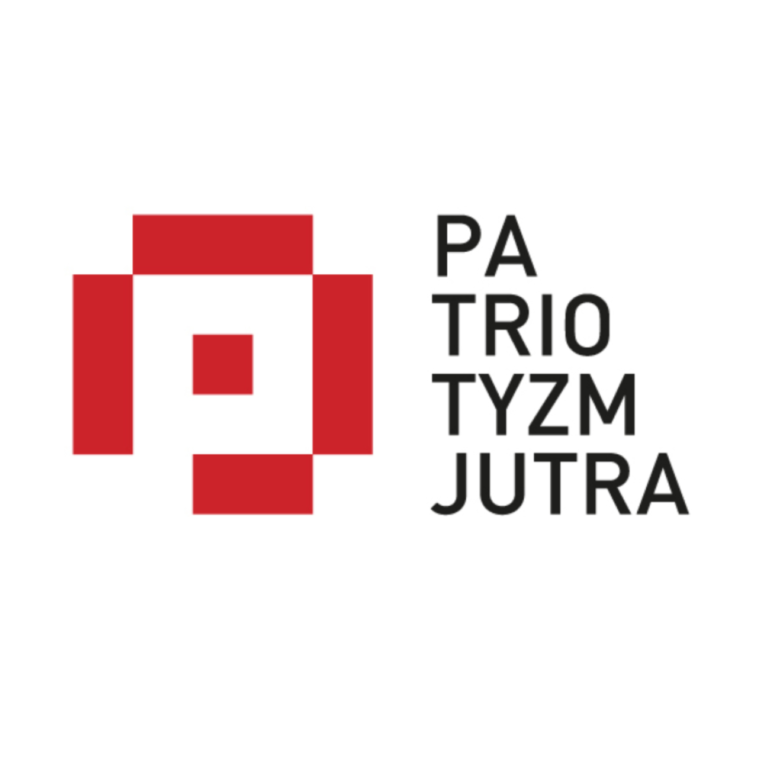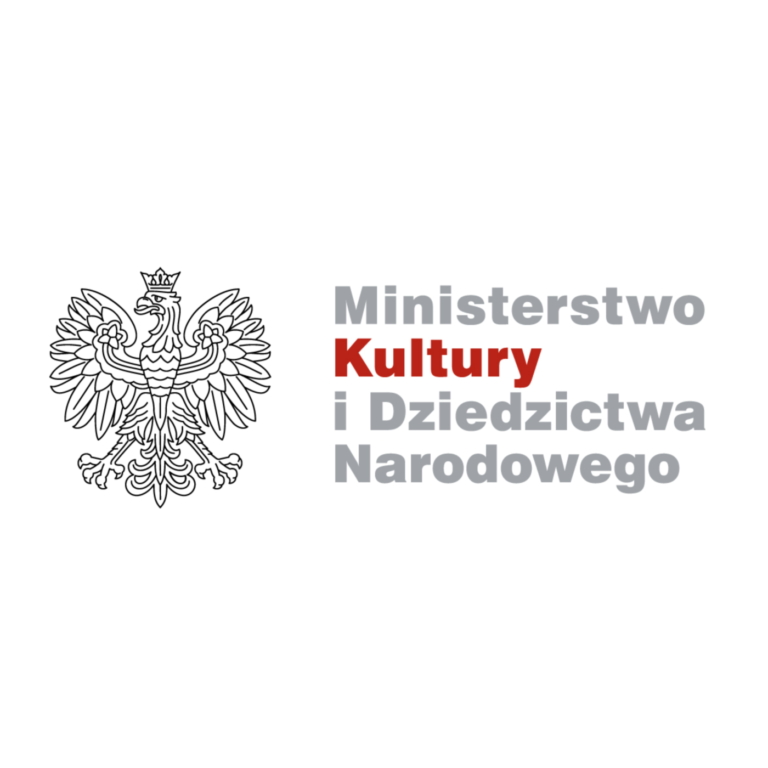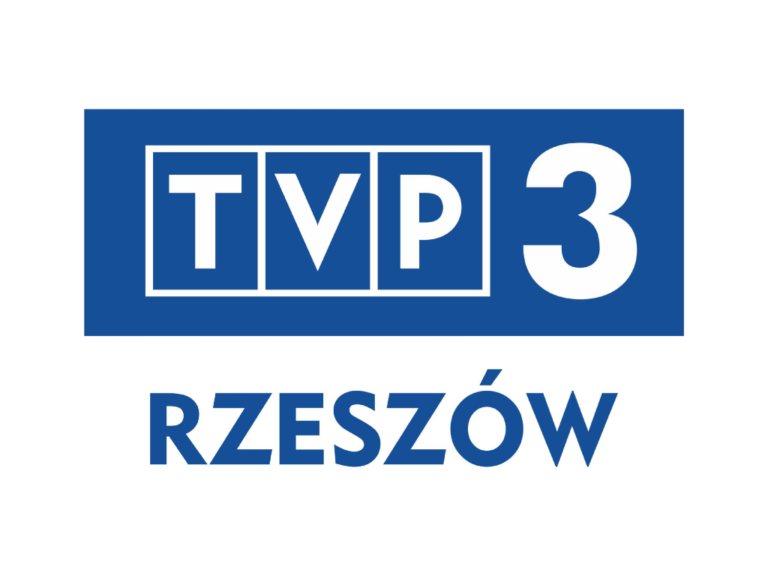Piotr Pilch: How did your opposition activities begin?
Adam Lozinski: I have been living in Przemyśl since 1984, and my Solidarity activity began earlier, in Gliwice. Actually, the beginnings were there, I was a young teacher, because my second year of work, when the Solidarity union had just been formed. Accidentally, certain considerations led me, as a young teacher, to be in its authorities. Gliwice is a big city, 1,000 members were in the Teachers' Company Commission, I found myself in the presidium of our Company Commission. I was responsible for contacts with the Regional Section in Katowice. I recall various things, I remember, the funeral of Primate Wyszynski; just then there was a conference of Solidarity history teachers in Warsaw. There weren't many people there, about 40 people. We discussed the need for changes in the teaching of history. I even kept the delegations, I have confirmation that I was there, but I didn't even realize it. I have them as a souvenir, I can show them. Such are the memories.
PP: Sure, such things are very valuable.
AL: I also came to Przemysl in '84. First of all, for family reasons, because my son was very ill in Silesia with respiratory diseases. In 1984 I came to Przemysl without knowing anyone. And those were not easy times for strangers, because they were looked upon with suspicion. I remember such a situation, although others have forgotten about it. We moved in in July, and in September it was announced at the KIK (Club of Catholic Intelligentsia) that they needed teachers to help, to teach. So I applied. And then my later friend asked who recommended me for the position. I replied that no one, because I had just arrived in the city. To this I was told that "here we don't need agents". This was very unpleasant. The next time I learned that there was to be a meeting of teachers and Mass at Holy Trinity Church. Mass was for everyone at 3 pm, and then there was a wafer for teachers, I went there and met teachers from Solidarity. In Przemysl there was a thriving teachers' ministry at the Holy Trinity Church, which was called "The Trenches of the Holy Trinity" There I met, among others, Ryszard Buksa. Earlier, an initiative was established in Warsaw, in Solec. There were monthly meetings, and from 1985 I went to them quite often. From there I brought back leaflets. I lived on Rogozinski Street, close to Zasanie station. I was afraid, more than once, to carry that package with leaflets home, so I thought "I'll throw it in the bushes." A lot of support for the pastoral care of teachers was provided by Father Stanislaw Zarych. And this lasted until 89, when "normality" came. Then I stopped going, but I met many people during this time. To this day I know Jan Zarych, a professor at the Institute of National Remembrance. It was then that he, as a young man, organized such pastoral meetings. That's how it started.
In 1989, I taught at Elementary School No. 13. There I founded the Solidarity Circle, one of the first in Przemyśl, and the first among elementary schools. Then I was in charge of setting up the Solidarity Workers' Commission, which covered the entire district. I traveled to Eagles or Krasiczyn. In those days teachers rarely had a car, I just happened to have one. I had previously been in the States, so I could afford to buy one, and yes, it would be impossible to get one on a teacher's salary. "Secretariat" of our Commission was located in the house of Mr. and Mrs. K. and R. Zurawski. I remember June 15, '89, the name day of Jolanta, our acquaintance. And on that day, I was elected Chairman of the Workers' Commission, I became head of the teachers' organization. Then, in 1990, there was the second Congress of Regional Solidarity, there I was elected to the Regional Board, I was even Secretary, but very briefly. Such typical union activities did not interest me much. I was in Solidarity to overthrow and create a new system, not to act as a trade union. I went to work in institutions, and some people resented this, because I stopped serving as secretary and became deputy superintendent in June 1990, and for four years I held a very important position in the administration of the Przemyśl province. As of April 1, the superintendent at the time was Piotr Idzikowski. At one point there was a meeting of the NSSZ Regional Section, there were people from Przeworsk, Jaroslaw, Lubaczow. We were electing a superintendent at that time. Our first indication was Wieslaw Beck from Lubaczow. And such was the decision that the previous superintendent should leave, and the minister appointed w. Beck. The next day on Saturday, however, Wiesiek called that it was too far to commute from Lubaczow to Przemysl every day. Solidarity was then on Grodzka Street, and I was at work. I called Jaroslaw, Lubaczow and informed them by phone that W. Beck did not want to be superintendent. In the course of these conversations, we agreed that Piotr Idzikowski would become our candidate. And it was Piotr we reported to the minister. These were difficult moments, but the matter itself was encouraging. It was not that the authority proposes and the Ministry approves. We proposed the person who seemed to us the best for the position. And it was from the Ministry that I was called individually, because it turned out that in Warsaw, the position of director of the minister's office, was held by a person I knew from the pastoral ministry, and asked if this was definitely the right candidate. And that's how Piotr Idzikowski was appointed superintendent of education. Those were difficult times at the superintendency. There were problems to dismiss previous directors, and we lived through it. There was a veritable war.
PP: Here the old system clashed with the new system. The old one still had its influence.
A£: Especially since at the beginning there was still no new law on the education system. It entered in September 1991, but we used it. The superintendent himself could make regulations for appointing directors. Now it's complicated that the superintendent doesn't have much power, he's an executor, more important is the Commission, the Teachers Union, parents. We made it so that to the Commission three people were put forward by the superintendent, and three by the school. When there was a tie, the superintendent himself decided who would be the school director. That was a bit of a trick we did. This was in effect until 1991. Then I was dismissed when the governments changed and the SLD came in. From 1994 I worked in local administration, I was head of the Department of Education at the City Hall. It was only then that the department was established in the city, before that the city was not in charge of schools, only kindergartens (there was one person in charge of kindergartens in the Department of Culture). In 1996, all schools were taken over by local governments. In Przemyśl, two years earlier, the city was the governing body.
PP: And what did it look like then? Was it a good reform? Was it desired by the public?
AL: Rather, yes, previously it was handled by the state, the superintendent was the leading authority: he was in charge of management, finances, appointing principals, responsible for everything in the school. On the other hand, there was also a pedagogical supervisory body. And the superintendent performed these two functions simultaneously. When local governments took over the running of institutions and became the leading authorities, the superintendent was in charge of pedagogical supervision, doing inspections, visitations, checking the qualifications of candidates, the state of student knowledge. I think this was better, until now no one questions it. Yes, there was a problem as usual with money. Who was supposed to pay for it? It was invented that from the state budget, cities (local governments) would receive subsidies per pupil. This was calculated in detail. However, the money was less and less, at the beginning this subvention was calculated in such a way that it was quietly enough to run schools. Now, for a long time, the subvention is not enough and the city has to contribute from its budget. I don't know how it is today, but once in Przemyśl, in the 1990s, the city added little from the budget, while in Warsaw, on the other hand, the authorities added almost 100% to the subvention. In our country at the beginning of the 21st century, no more than 3 percent was added. Let's note what disparities these were. The city could play a good role and either they gave money and education was a priority, or not. Now the city of Przemyśl is adding 25 percent, and Warsaw has reduced because it is only adding 70 percent.
As for my activity in the Przemyśl Cultural Society, I was a member at the end of the 1980s, and I only found out about its reactivation later. I was not invited to the reactivation meeting. I wasn't the only one, by the way. I learned that the election meeting was held, being at Calvary, on another occasion. I was not the only one surprised that some comrades were forgotten. I don't say this with resentment, but with mild surprise. When I received the invitation to the Society's meeting and Chairman Marek Kuchcinski was there, I thought it was his function from the old days.
What else can I boast about? I received a medal from the Metropolitan of Przemysl in recognition of my service to the Church of Przemysl.
PP: Such things are also collected as much as possible.
AL: I have never belonged to any party, i.e. since 1990 yes, but before that no. When I came to Przemysl, I could not work in a high school. One principal himself invited me for an interview, he knew that I worked at "thirteen" and wanted to hire me, but the party. I didn't belong to it, so he couldn't. He suggested that I at least enroll in the ZNP (Union of Polish Teachers), but I refused. That was in 1986.
PP: This hindered professional development.
AL: Yes, but I didn't care. At the other school, too, the headmaster directly said that they were "demanding" that they accept those who belong to the party. This was in turn in 1988. In Gliwice I also worked at an elementary school, but I also had hours at a high school. I suspect that if I had stayed there longer, I would have been given a full-time position. In the big city, there was no such emphasis on enrollment in the party. When I arrived in Przemyśl, in my first year there, I did not go to the May 1 parade. I was punished, I was not paid for the hours that day, 7 hours were deducted from my salary. In Gliwice we never went to parades, no one demanded it. Here in Przemyśl it was more wanted to show off. It was up to the local authorities how much emphasis was placed. I have been in contact with people from Gliwice until now.
I was also awarded the Cross of Freedom and Solidarity. You could receive it if you were active for a minimum of one year in the opposition. I had the difficulty that I had no record by the SB, so I had to get witnesses who confirmed my activities. As a result, I will receive such a Cross in September.
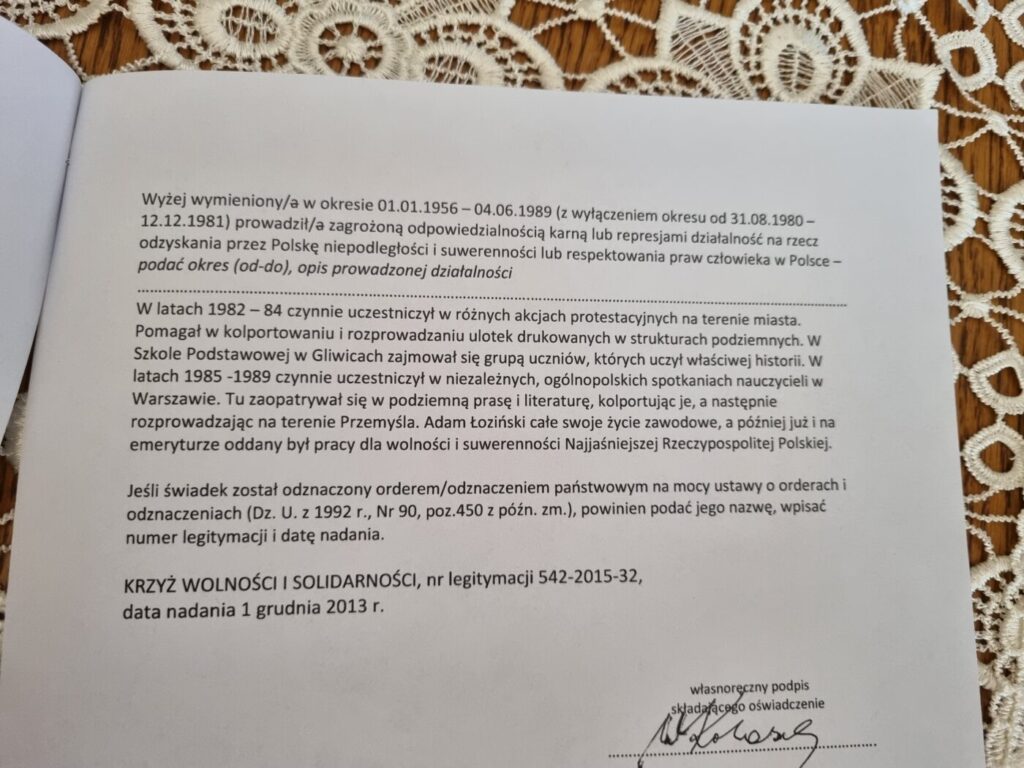
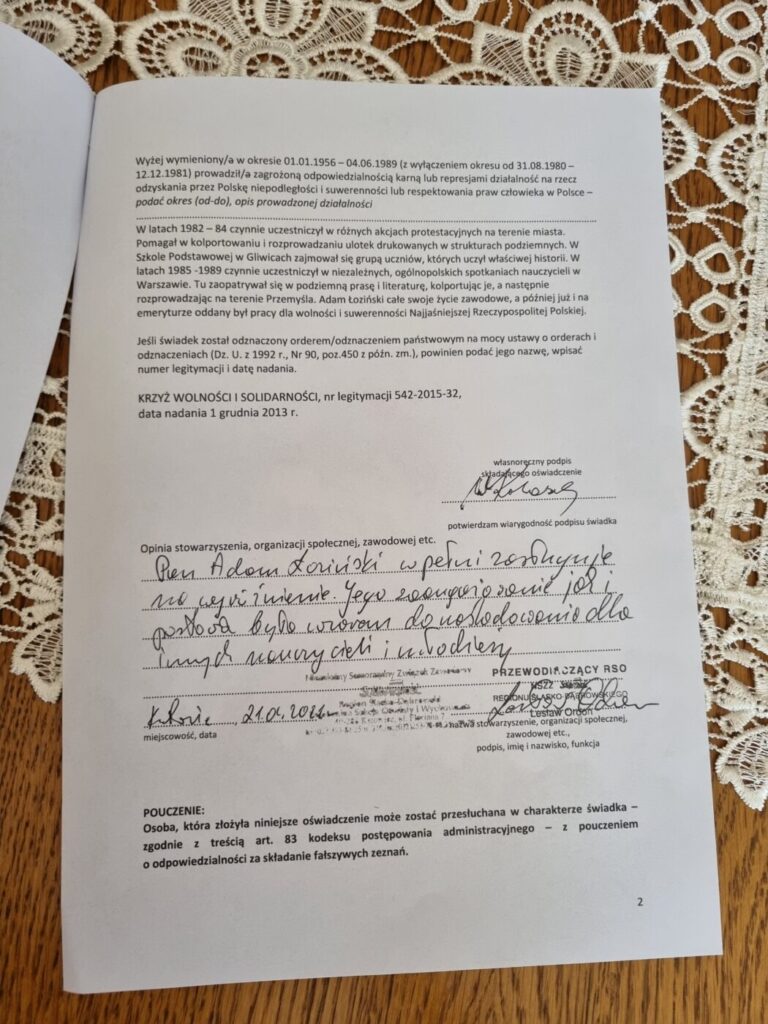
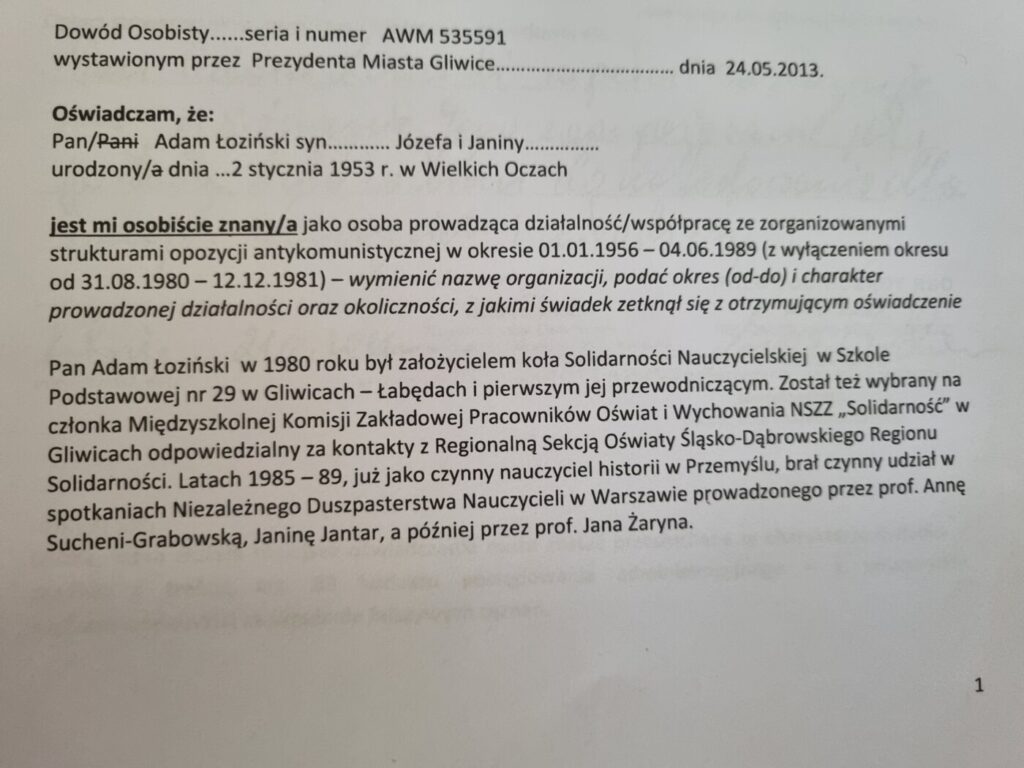
PP: Based on these statements is the Cross awarded? Where will the ceremony be held?
AL: Most likely in Rzeszow. The decision has already been made by the President of Poland.
(By order of the President of the Republic of Poland on February 1, 2022. Adam Lozinski was awarded the Cross of Freedom and Solidarity. The decoration ceremony took place on September 23 at the IPN Branch in Rzeszow)
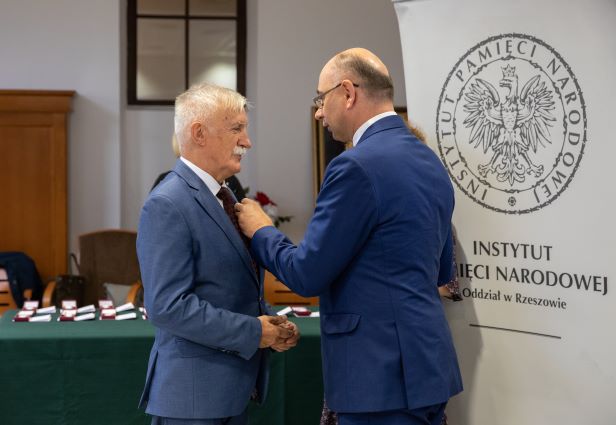
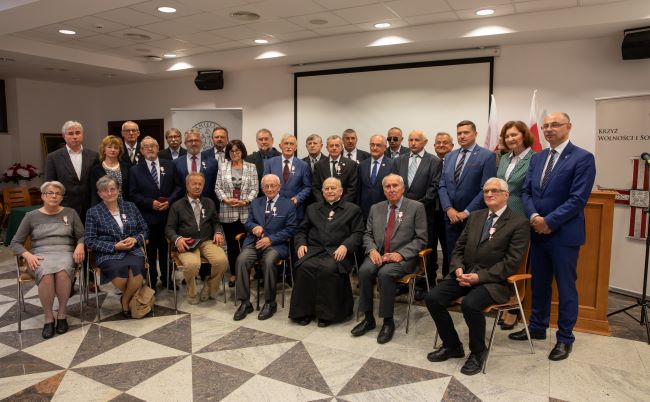
More than once I was surprised that teachers knew and had materials available about Katyn, for example, but did not use them. Regarding Msgr. Ignatius Tokarczuk, We had a good relationship, first in the 1980s I participated with teachers from the teachers' pastoral ministry in meetings to celebrate holidays or his birthday. Many times I went to him for private talks. They were always very fruitful, he convinced us that there would be freedom, that Free Poland would come. We didn't believe it, but he was right. Archbishop Tokarczuk had a nephew who was an MP. Through this nephew we got to know each other better. I was the one who gave the archbishop the information that his sister had died, I even offered a ride to the funeral, but the archbishop refused due to his health.
PP: I wanted to ask you about the time when you became an MP in 1997 and co-founded the commission for the reform of the new administrative division.
AL: This was a difficult issue for me. There was a dispute as to how far the government authority should reach, and how far the local government authority should reach. I have the impression that this problem has not been fully resolved to this day. The question was whether there should be local government or government administration at the provincial level. Secondly, the Accord of the Center since 1990 was my party, which I joined and I am loyal to it. Although there was a time when the PC brought in perhaps 12 deputies and a few senators to the Sejm. Out of 460, that was a drop.
PP: But you co-founded the government at the time, right?
AL: Yes, we had a deputy minister for roads: Krzysztof Tchórzewski. Also Antoni Tokarczuk was a minister, Jan Szyszko from our grouping was Minister of Forestry. These were also dilemmas. Even before the elections, our organization was involved in the issue of administration and division. The commission headed by K. Tchórzewski proposed 32 provinces. That was the idea. There are documents about this in the archives in Przemyśl. The Przemyśl province was supposed to be larger and reach all the way to Zamosc and the Bieszczady Mountains. That fell through. Meanwhile, the government proposed 12 provinces. Our province was to be Eastern Lesser Poland.
PP: Would it be acreage-wise similar to the current size of the province?
AL: Yes, similarly. There were disputes over Debica, Gorlice. As a result of the talks (it took a long time) 16 provinces came out. The question remained as to what powers the marshal should have. So far this has been clashing, and this is changing. Not the provincial governor, but the marshal is the host of the province. The provincial governor is the government's representative on the ground, and has a controlling and supporting role. Then there is the county. This is a local government administration, although it contains some government organizations, such as sanitation. This is such a different division. And the third level: local government-municipality. There was also a dispute over Przemyśl and more. Przemyśl was supposed to be a normal city and there was supposed to be a Przemyśl district. I remember that we submitted an amendment that all cities previously provinces became cities with county rights. There were dual powers, that is, municipal and county, in one body. Is this a good thing? At the time we thought that because of this there would be more money, one administration. It used to be argued whose road it was, but now all roads in the city are cities. Investments are also cities, the government has no right to invest anything in the city. A good example is the eastern bypass. It was the city that applied for the bypass and did it on its own, although the government, as a result of the support of MPs, subsidized this investment. With the western bypass, there is a dispute. If it is outside the city, the state bears the cost, but if in the city, the city bears the cost. Also the maintenance of the road, lighting, heating. Is this better?
So is the city of town. That's what I have on my record. The same about the middle school. I remember, to my recollection, how we discussed in the 1990s. We were convinced that the elementary school was too long. I remember when I was still teaching, there was a boy, he had learning difficulties, he was repetitive. After sixth grade , he went to another school and graduated from "elementary school" earlier than his peers. Elementary school was too long, there was no division into specialties to prepare for a particular direction, all the same. We wanted to change this, to make the school shorter, to have some kind of specialization. This didn't quite work out, because in middle schools, these divisions into specializations were also unequal. But our city, as a city with county rights, also adopted these schools. In Yaroslavl there was a different situation, there the city has only kindergartens and elementary school, secondary schools are handled by the district. And in Przemyśl everything is managed by the mayor. And this changed as a result of our reform. Now it has been reversed again. Is this a good thing? I don't know, I don't know about that anymore.
PP: It's hard for me to judge, since I studied in middle school, I would have to go back to school to compare the two. However, in the new system, this childhood age is extended, and in high school it is already time to grow up.
A£: I think elementary school should be shorter, and middle school and high school should be combined on the model of the pre-war small high school, for example.
PP: Maybe a 6 + 6 or 7 + 5 model would work. I agree that it could develop in that direction.
AL: This is the issue of these double reforms. Especially since I have been involved with education all my life, first as a teacher, then in government administration, then as a superintendent, in addition, I was involved in education as an MP. For nine years I worked at the Podkarpackie Teacher Education Center. I was not a pedagogical employee, but I organized courses and trainings. We received grants and used them for various purposes, organized courses and even distributed food. I was in charge of organizing improvement. I was asked if I was good at it, because it was not a very responsible organizational function. But I survived.
PP: I would like to ask you about the establishment of the National Eastern European University. I know that you participated in it and were in the authorities of the university.
AL: I was chairman of the Convention. There were two authorities: Rector and Senate and the Convention. That's what it was called. The Convention was made up of employees from outside the school. The chairman of the Convention and the Rector were two positions high in the administration. I was chairman of the Convention, and before that I was president of the Przemyśl Academy Society. This Society was founded back in the 1990s, in the 93rd or 94th. The late Tadeusz Sawicki president of the city, who was the first president of the Society, was still alive. Momentarily Marek Kuchcinski was also the chairman, and then I became chairman when I was already an MP. At that time I had the opportunities to create and organize this school. It's hard for me to say, but Jaroslaw had better arrangements at the Ministry. They were two years ahead of us. Our school was established in 2001, and theirs in 1999. There was a crush at the Ministry, the Minister came and wondered why the two establishments were so close to each other. He proposed to create a joint Przemyśl-Jaroslavl school. But neither the authorities of Przemyśl nor Yaroslavl wanted to agree on this. When we had more influence in the AWS, we finally succeeded in creating our school. The concept was for the University of Rzeszow to merge with several smaller schools. And the goal was to create a main academy in Rzeszow and smaller vocational schools in smaller cities: Przemyśl, Krosno, Tarnobrzeg. Then it turned out that they were being created in smaller towns, such as Przeworsk. This school of ours was supposed to be humanistic, having contacts with the East , to make agreements with Lviv and Ukraine. Did it succeed later? It turned out that the humanities are at a good level. For example, Jerzy Bartminski, who is one of the best Polish scholars in Poland and the brother of Father Stanislaw Bartminski, parish priest in Krasiczyn and local government activist Jan, taught here. The humanities haven't quite worked out here, I don't think there is even a Polish philology anymore. The focus is on science and technical majors. Humanities are going away. Nowhere, not even in Lublin, has a university been established that pursues eastern politics.
PP: With what is happening abroad, there is potential for such a university. The idea was already there, and so many years later it is still relevant.
AL: Maybe that will still happen.
PP: At the Carpathian Europe forum, there was recently mentioned the idea of establishing a cadre training university in Ukraine. But as far as I know, it is a very difficult thing to do.
AL: I think too many of these universities are being created. Maybe if things were different... I remember when I was a student in the 1970s, a few percent of young people were in college. It was 3, 4, 5 percent, that much. And now? It's like this, it will never be like this in any community, that the majority will have the potential to study. Yes, they can study, but what level will it be and what will be the results. And also, are there needs? We not only need educated people, but also such for other professions. And this is also the difference, parents have ambitions, send to schools, support with tutoring. And what is the point? Is that the point? Sometimes I read various books, for example, Stanislaw Zarych. He was from a small village and a school was sent to him. That was the thing, that in a natural way these young boys or girls... mostly boys, however, were discovered. They themselves were intelligent, supported financially and so on.
PP: Last question. I wanted to ask about the city council. You were a councilman for 12 years, including the chairman of the City Council. How do you recall it? How has the city changed during this time, because in three terms you can evaluate it.
AL: I did not feel these changes. As for the roads, it is positive that it was possible to build the eastern bypass. This is some positive aspect, the bridge. I myself rarely drive on it, I mostly go through the city. Public transportation has changed. These roads often break down, Bielska Street was recently repaired and such holes are already there. As for education, teachers by law are supposed to reach a certain level of salary. As there was not so much money, this should have been equalized. This has been in effect since 2009 , so it's been a dozen years. The snag was that little money was added to the budget in the city and teachers did not reach this level, only in January they were paid this equalization. I remember one year compensation was given for more than 3 million. In my opinion, it should be that this money in that previous year could have been given for extra classes, for function and incentive allowances. And this money was then given equally. Well, and it turned out that teachers were given equally. Some treated it as a fourteenner. There was such an allowance that they even got PLN 1,000 each. I more than once spoke about the fact that they pay teachers for free, without providing work. This is a failure, I could not convince the Council. Now I do not know how it is, but this system has been preserved. As for management, there is no team in our country that wants to sit in one circle and do something. This is the biggest shortcoming. I think in local governments in general. Everyone wants to do something, some don't. I was in such a good situation that I worked part-time and could devote myself to the Council. When someone works, for example, in Rzeszow, he doesn't have time to devote to the Council. These are such dilemmas, now a term of 5 years. I myself voluntarily gave up another start. In my opinion, local government is needed but really the selection of candidates for councilors. I know that Law and Justice organized preparations. The law is not so easy. The law on the education system in 1991 had a dozen pages, now they are hundreds. This is how they are composed. Is this good or bad? I know that before the war it was also bad. And in Przemyśl it is so that the Council does not pass the discharge, but the Regional Audit Office gives a positive opinion. And that's it, there are no consequences. The Council could initiate the removal of the president, but is that good or bad? This I do not know. But the governmental and administrative body I generally evaluate positively. How positively? We decide for ourselves, the Council can do a lot. It's good that I don't have to worry about it anymore.
PP: The Lord has already done his part.
A£: Yes I did as much as I could. But I have no reproaches. There was such an idea in the city to socialize kindergartens, that is, to give them to organizations to run them, but there was a great rebellion. As a result, maybe it would be a positive thing, because we have 14 public kindergartens, and there are more than 20 non-public ones. There are so many of these institutions, maybe they perform their function better, they are cheaper for the city because the city pays 50% subsidies. Then maybe they are better?
I remember that we once went to Nowy Sącz, because there was also such an initiative there. One of the editors of Zycie Przemyskie wrote an article about me under the title "I am what I am". Actually, it was an interview with me. It referred to this reform. There were protests, but President T. Sawicki, so other employees of the Department recall, believed in the initiative and had confidence in us. He told me that I was "honest to the basement." I don't know what that meant. I'll say it again: local governments should be, the authority should be closer to the people, but I don't really feel that authority now. We have Estate Councils in Przemyśl, a kind of lowest authority in local government. In our city, here where we live, it is the Warneńczyk Estate. It extends from Wolodyjowski Street to Salesian Street. And on the other side of Węgierska and Grunwaldzka is the Kmiecie Estate, which is from Constitution Square all the way to Ostrowska Street. A strip of land between San and Grunwaldzka. This should be a cluster of people who have common interests. What are the common interests of the man from Constitution Square and the man from Ostrowska Street? I have always stressed that this needs to be changed. We have 21 settlements and they, in my opinion, should have more power, have their own budget. This is a lower administration that also speaks at the session. And this is not best resolved.
PP: I agree. They have direct contact with the people, they know best what is happening in their area, and their voice is not heard. And they are invited to a session, they will say something, and their opinion is not binding, no one counts with it.
PP: You as a historian surely know this best.
AL: What about Ukraine? Well, exactly. I believe it's going all the way towards easing our relations. I hope so. So far it has been uninteresting there. In Ukraine, they are looking for their ideology, they are looking for what they have in common, they are reading their history, just like other countries. Ukraine is a young country. As I remember the early 1990s, when we had contacts with Lviv and beyond. In Lviv, the image of the Mother of God and the flag hung in schools. This was the basis of their ideas. And now an example of a cruel, painful case in Lviv. On the building of School No. 10 there is a bust of Roman Shuchevych, one of those responsible for accepting the Volhynian Massacre. School No. 10 is one of two so-called Polish schools, near the Maria Magdalena Church. I once asked the headmistress what the issue was. I heard that this is what the authorities decided, and this is how it must be in a Polish school as well.
PP: In Ukraine they have them as heroes. But even now, during the war, heroes are being created.
A£: They make their history in a painful way.
Interviewed by Piotr Pilch
